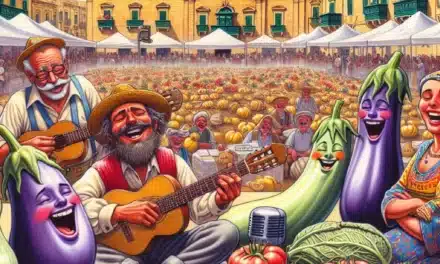Of Figs and Thieves: The Great Maltese Ġulepp Crisis
The Peculiar Predicament
It all started in Qormi, known for its bread but not so much for its figs. Carmelo, a local farmer with a penchant for innovation, had decided to revolutionize the Maltese fig industry. He crossbred a fig from Gozo with a mysterious plant he found on a secret trip to Filfla. The result? The sweetest, juiciest figs anyone had ever tasted—or so claimed Carmelo’s marketing brochure, which was riddled with spelling errors that somehow made it more endearing to the locals. The concoction was named the “Ġulepp,” a term that drew puzzled looks from expats but made the Maltese chuckle at the cheekiness.
But as the first harvest of Ġulepps approached, Carmelo woke up to a disturbing sight: the figs were vanishing, one tree at a time. Suspecting foul play, he called upon his friend Toni, an ex-politiaman turned private detective whose mustache was as thick as the plot of this story.
The Bumbling Investigation
“I’m telling you, Toni, this is the work of professionals,” Carmelo lamented, his face as wrinkled as a sun-dried tomato.
“Or goats,” Toni replied, stroking his mustache. “Goats are known felons in these parts.”
Armed with nothing but their wits—and a few hobż biż-żejt sandwiches for sustenance—Carmelo and Toni set off on an investigation that led them through Valletta’s narrow lanes to Mdina’s silent city.
Each clue was more baffling than the last, from a trail of fig seeds leading to a suspiciously sticky-fingered statue of St. Publius, to whispered rumors about a cult worshipping a fertility idol made entirely of Ġulepps.
The Astonishing Twist
The true mastermind, however, was none other than Doris, Valletta’s sweet old lady who ran a clandestine fig-black market empire out of her pastizzeria’s back room. Her “special ingredient” for pastizzi had everyone coming back for more, and little did they know, it was all thanks to the rare Ġulepp.
Toni finally confronted Doris while she was overseeing a covert fig drop at the Azure Window ruins—now a hotspot for black market dealings since the window itself had tragically toppled into the sea years prior.
“Aha, Doris! I knew those pastizzi tasted too good to be true! What’s your game?” Toni accused.
“Uwejja, darling,” Doris smirked. “If life gives you Ġulepps, make pastizzi! It’s simple economics.”
Making a Deal: The Figgy Truce
In a twist no one saw coming, not even the writer of this story, Carmelo decided to strike up a deal with Doris. He would supply her pastizzeria with Ġulepps, under the condition that they market it as a specialty dish, dubbing it “Pastizzi tal-Ġulepp.”
And so, the great Maltese Ġulepp crisis came to an end, not with a bang but with a batch of golden, crispy, fig-filled pastizzi. Even Toni, now acting as their unofficial quality control inspector, had to admit—crime had never tasted so sweet.
The Moral of the Story
In Malta, where the air smells like sea salt and baking bread, even theft could turn into a thriving business partnership. The people learned that sometimes, kollox is well that finishes well. Especially when the finish is as delicious as a freshly baked Ġulepp pastizz.
Now, dear readers of the ‘Times of Mela’, before you go hunting for these mythical Ġulepps, remember: this story, like all good Maltese legends, is dipped in truth and deep-fried in imagination—just like a good pastizz.
And if you ever find yourself in Qormi, keep an eye out for Carmelo’s fig trees. Who knows what he might crossbreed next? Maybe a cactus that sprouts ħobż biż-żejt? In Malta, stranger things have truly happened.







Recent Comments